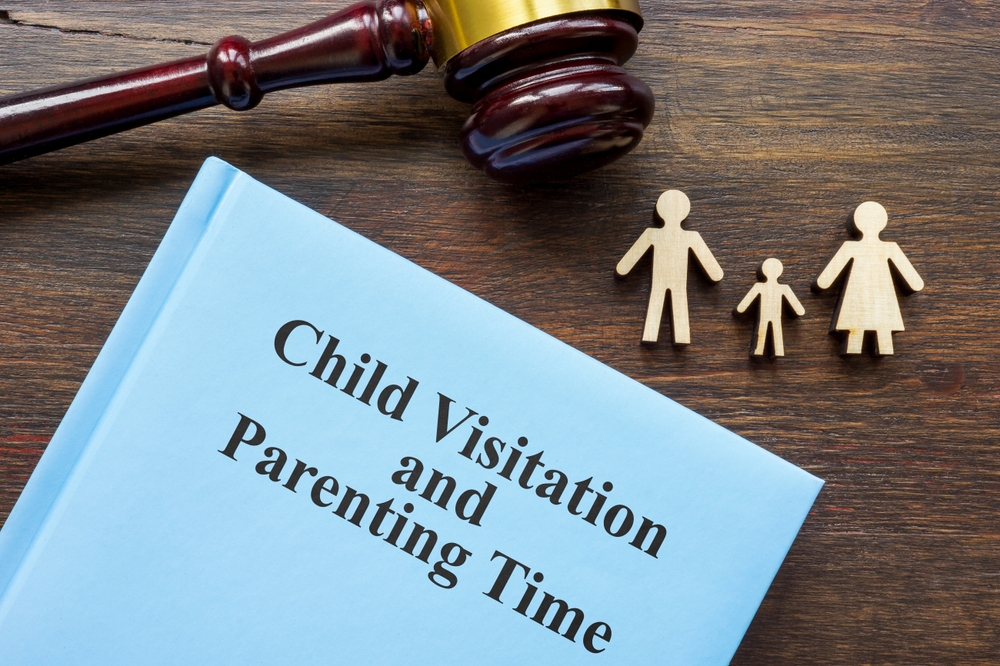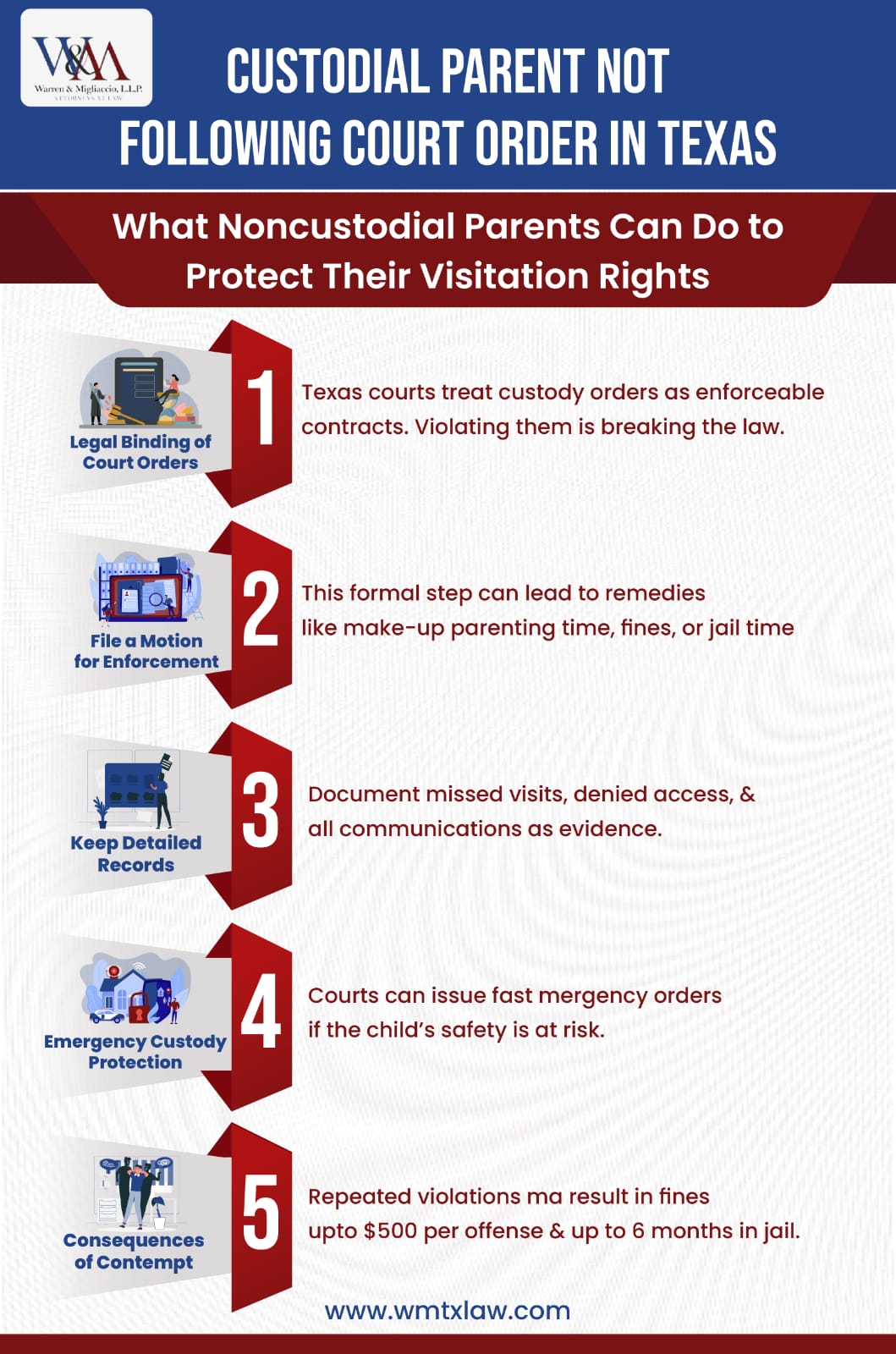As a family law attorney in North Texas, I have seen how challenging it can be when a custodial parent does not follow a court order. It is especially upsetting if you are denied time with your child after a judge has already decided you have that right.
Need-to-Know Highlights
- Violating a Texas custody order is illegal—courts may fine, jail, or even change custody when a parent ignores the order.
- Meticulous documentation is vital. Keep dated logs, messages, and witnesses for every denied visit or violation.
- File a Motion for Enforcement to request make-up parenting time, attorney’s fees, and contempt penalties.
- Emergency orders are available if a child’s safety or relocation risk demands immediate court action.
I recall one father who drove three hours each way for his weekend visits. When he arrived, no one was home time after time. I could see how sad he felt, and it pushed me to help parents who go through this struggle.
When custody arrangements fail, it is more than a legal matter—it is about protecting your bond with your child. Texas family law courts take these issues seriously. There are clear steps you can take to assert your superior right and keep the best interest of the child at the forefront.
In this article, I will describe your practical options when a custodial parent is not following a court order in Texas. I will share insights from the many child custody cases I have worked on across the state.
Court Order and Family Law Essentials
Before we look at enforcement actions, let’s understand the legal framework in Texas.
Understanding the Texas Family Code
The Texas Family Code provides detailed rules for child custody matters. Section 153 covers conservatorship, possession, and access, while Section 154 covers child support. The code also explains how to enforce a suit affecting the parent-child relationship, including custody issues, under the various laws governing these matters.
In my practice throughout the Dallas-Fort Worth area, I have seen many parents who do not realize that Texas law treats court orders like binding contracts. When a parent violates these terms, they are not just upsetting the other parent—they are breaking the law.
Texas family courts make sure parents follow custody order and visitation rules. Judges can use different penalties to make a non-compliant parent obey the possession order again.
Determining the Child’s Best Interests
Courts in Texas base decisions on what they believe meets the best interest of the children involved. This involves:
- The child’s physical and emotional well-being
- How stable each parent’s home is
- Each parent’s ability to meet the child’s needs
- The child’s relationship with each parent
Texas law does not use the word “custody” in a legal sense. Instead, it uses terms like conservatorship, possession, and access:
- Conservatorship: Who can make important decisions for the child
- Possession and access: When each parent has the child
These terms are similar to what people usually mean by “custody” and “visitation.”

Seeking Enforcement: A Look at Texas Court Statistics
When custody agreements break down and a custodial parent does not follow the court-ordered schedule, filing an enforcement action is a serious step to address these violations. In Fiscal Year 2023, Texas Statutory County Courts saw 709 new “Enforcement” cases filed under family law (source, Page 1). These are separate from cases about child support enforcement. They often involve possession order or visitation rights problems.
Those 709 cases show that many parents turn to the court after other efforts fail. Mediation is encouraged first, but Texas Family Code Chapter 157 outlines how enforcement works once you go to court.
As of the start of Fiscal Year 2023, 2,559 “Enforcement” cases were already pending (source, Page 1). This signals that resolving custody issues can take time. Still, the legal system has tools to help you if the custodial parent is not obeying the court order.
Child Custody and Child Support in Texas
Defining Custodial vs. Non-custodial Parent
In Texas family law, the custodial parent (also called the “primary conservator”) usually decides where the child primarily lives. Meanwhile, noncustodial parents often face challenges in ensuring their parenting time is respected, frequently dealing with issues such as denial of visitation by the custodial parent. Typically, the noncustodial parent has parenting time based on either a standard possession schedule or a custom one established by the court.
On a day-to-day basis, the custodial parent handles routine decisions. However, both parents may share responsibility for major choices, such as those involving education or medical care, depending on the type of conservatorship in place. Nevertheless, successful co-parenting often requires open communication and a willingness to be flexible. In my experience, many conflicts arise from a rigid “my time” versus “your time” mindset, which, unfortunately, can negatively impact the child in the long run.
Court-Ordered Support Obligations
Child support in Texas follows guidelines based on the non-custodial parent’s income. Typically, it starts at 20% of net income for one child and goes up to 40% for five or more children. In Texas, support payments can be taken directly from wages to ensure they get paid.
Paying child support is a crucial financial obligation for the non-custodial parent, regardless of age, marital status, or living arrangement. I recall a case where a father stopped making child support payments because the mother would not let him see his child. I had to explain that support and visitation are separate legal duties. If you stop paying support because you are denied visitation, the court might:
- Garnish your wages
- Suspend professional licenses
- Revoke your driver’s license
- Place liens on your property
- Intercept your tax refund
- In severe cases, order jail time
The law sees child support as the child’s right, not the other parent’s. One parent’s bad actions do not excuse the other parent’s non-compliance with the support order.
Custody Order Violations: Enforcement Actions and Remedies
When a custody order is broken, you have options. To enforce a visitation order, you can file a motion for contempt in the same court that gave the original order. You must list the specific violations you have experienced.

Identifying Non-compliance
A custodial parent might:
- Refuse to allow court-ordered visitation
- Always be late for pick up or drop off at the pick up location listed
- Make the child unavailable during your scheduled time
- Block phone calls or other contact
- Move without letting you know
- Make big decisions without your input, when they are supposed to share that responsibility
It is crucial to keep track of every violation. Helpful records include:
- Dates and times of denied visits
- Text messages or emails about the violations
- Phone call records (including missed calls)
- Notes on the child’s condition or comments
- Witness names who saw these issues happen
This evidence becomes vital if you go to court.
Filing a Motion for Enforcement
If informal discussions do not fix the problem, you can file a Motion for Enforcement with the court that created your custody order. This motion tells the judge what violations occurred and requests the judge to enforce the existing order.
Typical steps include:
- Preparing and filing the motion with details of each violation
- Serving the other parent with the motion
- Attending a hearing to present your evidence
- The judge deciding on the remedy
In Dallas County, I have seen judges start with smaller penalties like extra visitation time to make up for missed visits. But if the custodial parent keeps breaking orders, judges may take stronger steps.
Possible remedies include:
- Make-up parenting time
- Changing the custody agreement
- Ordering the violator to pay your attorney’s fees and court costs
- Fines
- Jail time for contempt of court
Under texas family law, a judge can give additional parenting time to make up for visits you missed.
Contempt of Court and Its Consequences
What Is Contempt of Court?
A noncompliant parent commits contempt of court when they purposely disobey a court order. In family law matters, this often applies to repeated violations of a child custody order or visitation schedule.
Texas has two types of contempt:
- Civil contempt: Aims to make the parent obey the order in the future, possibly by fines or keeping the parent in jail until they comply
- Criminal contempt: Punishes past disobedience, usually through fines or a set jail sentence
I once represented a client whose ex-wife denied six weekends in a row. The judge found her in contempt, gave her a three-day jail sentence (which was suspended), ordered make-up visits, and made her pay $2,500 in attorney’s fees. The judge said if she did it again, the jail sentence would go into effect right away.
Penalties for Contempt
Texas family courts can enforce penalties such as:
- Fines up to $500 for each violation
- Up to six months in jail per violation
- Ordering the parent to pay the other parent’s attorney’s fees and court costs
- Giving the wronged parent more time with the child
- Assigning community service
- Changing the custody arrangements if the violations continue
In extreme situations where the child’s well-being is at risk, the court may call in law enforcement or Child Protective Services.
Case Study: In re R.J.K. – Enforcing Holiday Possession in Texas
A well-known example is In re R.J.K., No. 02-07-00409-CV, 2008 WL 4179742 (Tex. App.—Fort Worth Sept. 11, 2008, no pet.) (mem. op.).
The father asked the court to enforce the custody order because the mother repeatedly kept him from his Spring and Christmas Break visits.
The trial court found the mother in contempt of court. It also ordered her to pay the father’s attorney’s fees. The Fort Worth Court of Appeals supported that decision.
This case shows that texas courts take visitation rights seriously, especially when holidays are involved. If you break a possession order, you risk:
- Being found in contempt
- Facing monetary penalties
It highlights how following court orders is crucial to protect the child’s and parents’ interests.
Visitation Order and Parenting Time Disputes

Court-Ordered Visitation vs. Denied Access
Visitation schedules in Texas usually follow a Standard Possession Order (SPO) unless the court decides otherwise. This standard plan typically gives the noncustodial parent:
- 1st, 3rd, and 5th weekends of each month
- Thursday evenings during the school year
- Extra time in the summer
- Alternating holidays
When the custodial parent refuses this set schedule, they are not only violating the law but also harming the child’s relationship with the other parent. Courts in Tarrant County pay close attention to repeated attempts to block visitation time, seeing them as proof that the custodial parent might not be acting in the child’s best interest.
Mediation and Alternative Dispute Resolution
Courts often suggest mediation before a hearing, and it can help. Mediation benefits include:
- Less conflict than a courtroom
- Faster resolutions
- Lower costs than a trial
- More adaptable solutions
- Healthier long-term co-parenting
Mediation is also an excellent opportunity to create comprehensive parenting plans, which outline the responsibilities and rights of parents regarding the care and visitation of children. These plans help ensure that both parties adhere to the agreed terms and minimize future disputes.
For example, I recall a particularly tense case where the mother denied visits because she believed the father was speaking negatively about her to their child. However, through mediation, we were able to establish clear communication guidelines. Once her concerns were acknowledged and addressed, the visitation issues largely resolved.
Modifying a Child Custody Order in Texas
Requirements for Modification
Sometimes enforcement actions are not enough, and you might need to change the existing order. Proving a substantial change in circumstances can be one of the most challenging aspects of modifying a custody order in Texas. To modify a custody order in Texas, you need to show:
- A material and substantial change in circumstances since the last order
- That the change is in the best interest of the child
Major changes can include:
- Ongoing violations of the current order
- Changes in a parent’s living conditions
- One parent moving
- New needs for the child
- Substance abuse issues
- Family violence
I have seen judges in Collin County treat repeated violations of court orders as a big deal when deciding if primary conservatorship should shift.
Court Processes for Modification
Modifying a custody order often involves multiple steps that affect all parties involved:
- Filing a Petition to Modify the Parent-Child Relationship
- Serving the other parent
- Possibly attending a temporary orders hearing
- Exchanging evidence (discovery)
- Mediation
- A final trial if necessary
This can take a few months. If there are serious concerns, the court may issue temporary orders to protect the child while the case is pending.
Emergency Custody in Texas: Protecting a Child’s Well-Being
When Can Emergency Custody Be Granted?
In urgent cases, Texas family law allows courts to give temporary emergency orders to protect the child’s welfare. These usually happen when:
- The child’s health or safety is in immediate danger
- The child has been abused or is at risk of abuse
- There is a threat of the child being taken out of Texas to avoid the court’s control
I once helped a parent who learned the custodial parent was leaving their 8-year-old alone overnight. We got an emergency order within 24 hours, showing how fast courts act when necessary.
Impact on Parental Rights and Arrangements
Emergency orders are short-term. They last until a full hearing, usually within 14 days. After that hearing, the judge might extend the temporary orders or create a different arrangement, which could include legal consequences such as the suspension of state licenses for non-compliance.
If you think your child is in danger, reach out to a family lawyer right away to learn your legal options.
Seeking Assistance for Child’s Return
Involving Law Enforcement
Sometimes, the police can help enforce a child custody order, especially when:
- The order has language clearly letting police help
- The child’s safety is at risk
- A parent refuses to return the child after visitation time
- There is possible parental kidnapping
- A social worker is involved in cases of abuse or neglect to supervise visitations and perform custody evaluations
However, many officers see custody disputes as a civil matter unless the order clearly says they can step in. That is why it helps to have specific language in your order allowing law enforcement to assist.
Filing a Suit Affecting the Parent-Child Relationship (SAPCR)
A Suit Affecting the Parent-Child Relationship (SAPCR) handles most child-related issues in Texas, such as:
- Deciding who the child’s parents are
- Setting conservatorship
- Ordering possession schedules
- Ordering child support
- Enforcing or changing previous orders
If a parent will not return a child, you may need a Writ of Habeas Corpus. This court order tells law enforcement to take the child and return them under the court order. Non-compliance with such orders can result in a money judgment, including fines and payment of attorney’s fees.
Although it is not common, I have managed a few habeas corpus cases. They are quick and very effective for serious violations. Courts often set these hearings within days.

Frequently Asked Questions
Identifying Violations & Immediate Steps
What is considered a custody order violation in Texas?
A violation happens any time a parent fails to comply with the court-ordered plan, such as:
Refusing or withholding planned visitation time
Regularly showing up late for exchanges
Blocking phone calls or video chats
Moving the child without permission or notice
Making big decisions alone when both must agree
Courts treat these problems seriously because they can harm the parent-child relationship.
What can I do if the custodial parent won’t let me see my child in Texas?
If you are denied court-ordered visits, the best way to ensure you can spend time with your child and show the judge what’s happening is to build a clear record of the other parent’s non-compliance before filing for enforcement.
Write down every incident with dates, times, and details
Send calm reminders in writing that quote the order
Do not retaliate by stopping child support or getting angry
Consult a lawyer or file a Motion for Enforcement if it continues
Child Support & Enforcement Process
Can I withhold child support if my visitation rights are denied?
No. Texas law keeps child support and visitation separate
. If you stop payments over denied visits, you risk:
Wage garnishment
License suspensions
Contempt of court
Seizure of tax refunds to settle outstanding financial obligations
When visits are blocked, the right step is to enforce the court order, not withhold support.
How do I file a Motion for Enforcement, and what evidence do I need?
Filing process
Get the enforcement forms from the court clerk or your law firm
List each violation with specific dates and times
File a request in the same court that issued your order to enforce the existing order
Serve the other parent
Key evidence
Logs of denied visits
Texts or emails showing refusal
Witness statements, police reports
Records from co-parenting apps
Thorough, organized proof can greatly help your case.
Penalties, Emergency Orders, and Modifications
What penalties can a custodial parent face for ignoring court orders?
Texas courts can enforce:
Firstly, make-up time for missed visits
Secondly, contempt of court (fines up to $500 per violation or up to six months of jail time)
Thirdly, paying the other parent’s attorney’s fees
Fourthly, changing conservatorship if violations repeat
All these measures encourage following the court order and keep the child’s interests first.
When can I seek emergency or modified custody in Texas?
Emergency Custody
If the child’s safety is at immediate risk from abuse or neglect, or if the child may be taken out of Texas, courts can give orders fast under certain circumstances.
Modification of Custody
You must show a substantial change in circumstances (like repeated violations, a move, or danger to the child) and prove it benefits the child to modify the order. Speak with an attorney if you think urgent steps are needed.
Legal Representation
Do I need a lawyer to enforce or modify a custody order?
You can represent yourself, but a family lawyer is strongly advised because:
Enforcement actions have strict rules
Mistakes can get your case thrown out
Courts hold both lawyers and non-lawyers to the same standards
The other parent may have their own attorney
A lawyer can protect your legal rights, guide you through court proceedings, and help keep the focus on your child’s needs.

Conclusion: Navigating Family Law to Protect Your Rights
When a custodial parent is ignoring a court order, it is vital to act quickly and smartly. Keep detailed records of each violation by the other party, communicate in writing when you can, and seek legal help if things do not get better.
From my experience in family law cases around Texas, judges take non-compliance seriously—but they need clear evidence and properly filed motions to help you. If you appear with organized proof and follow the right steps, you have a much better chance of success.
While enforcement actions may be needed, the main goal is still to build a working parenting plan that meets your child’s needs. If you can, try reasonable talks first. If that fails, then go to court for relief.
Whether you’re facing challenges with custody enforcement or need help understanding your options, our experienced family law attorneys in Texas are here to support you. We can walk you through your situation, answer your questions, and help you take the next step. Call us at (888) 584-9614 or contact us online to schedule a consultation.
Disclaimer: This article is meant for general information only. It is not legal advice. Your specific case may differ, so speak with a qualified family law attorney about your situation.

